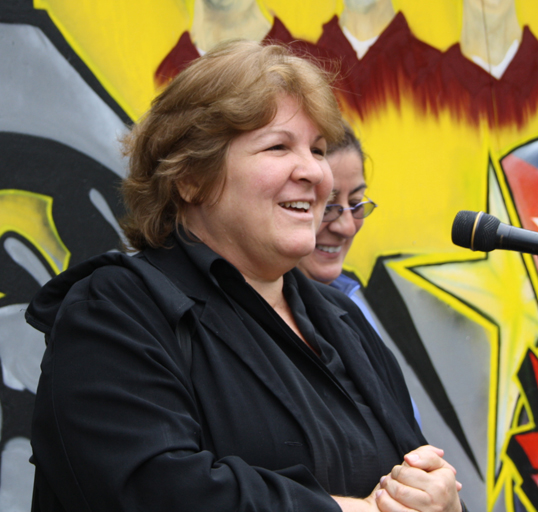
Dr. Aleida Guevara gives speeches around the world about her father’s teachings.
Photo courtesy of the Vancouver Communities in Solidarity with Cuba
Dr. Aleida Guevara was only seven years old when her father, famous Argentine Marxist revolutionary Ernesto “Che” Guevara, was executed. She laments that she was unable to spend much time with him, and has few stories about her childhood with him. But she does recall that, even while he was away, she and her siblings would receive anecdotal stories and drawings about animals that would bite off his leg if, for example, her little brother, Camilo, continued to swear in school.
Like many of us, Aleida Guevara grew up knowing Che through his writings and teachings. At the age of 51, she travels the globe making speeches that talk about her father’s ideals and mentions that his writing is full of “political insights and emotional maturity”.
She is a pediatrician in her own right just like her father, writer and author of Chavez, Venezuela and the New Latin America, and when she’s not participating in conferences around the world she is helping run two homes for disabled children in Cuba. She, alongside other Cuban scholars will be participating in this year’s 5th Annual International Che Guevara Conference from November 2–5.
We asked her to give us some insights on Cuban multiculturalism, the importance of her father’s ideals in our modern world and some of the issues that the conference aims to address.
The Source Newspaper: You are of mixed ancestry (Irish-Argentinian), how has this shaped your life as a person?
Aleida Guevara: I am Latin-American and Afro-Latin American. I also have indigenous blood in me, and surely some African in my genetics. What I’m very proud about is the fact this is, in fact, very multicultural. In my country there is a saying that we have the persistence of Asians, the stubbornness of the Spanish (hard-headed) and the joy and strength of Africans. Interesting, right? And this mix makes us a complete people.
TS: What can Canada learn about Cuban multiculturalism?
AG: We are different in many ways, but you are also a country with lots of cultures although, perhaps, you don’t mix together the way that we do. But you seem to have something great here, and I hope you’re enjoying it.
TS: Cuban president, Raul Castro, is softening his stance on exit permits. For those who choose to leave Cuba, what country in the world would give them the best opportunities?
AG: It depends on what those people wish to gain. If they emigrate because they have fallen in love, then they will feel happy where they feel loved. If they are looking for a better economic situation, honestly, I think the best place for them is in our country, so that they can help to continue to strengthen and to better our society. Ultimately, this depends on the values of each human being. If they just want to see or get to know about the world, then I recommend they go to Rome, Athens, Cairo, Macchu Pichu, the waterfalls of Iguazú or Niagara Falls, many other places in the Middle East – there are wonderful things to see in those countries – or the natural parks in the Sahara desert. In the end, any place where we are treated with respect.
TS: Which one of your father’s teachings do you most identify with and apply to your own life?
AG: All of them because, as a human being, he taught us that it is possible to be better people, if we are of service to our people.
TS: Why are your father’s ideals important in a world that has, largely, rejected Communism?
AG: Because he fought for a better world. Look around you and tell me, honestly, if you think there is social justice in this respect. As a journalist, you must know and have information of the reality we live in. Each day there are more and more differences between the rich and poor. Each and every day, thousands of children, under the age of five, die of starvation on this planet, or die from illnesses that could’ve been cured, and in many cases, can be prevented. Look around you. Education is being privatized. Health systems are losing their social consciousness. How long do you think people will support so much injustice? By chance we react, and it’s better to try and fight to change this reality. Don’t you think?
TS: What do you think we, as people, need to do to build a more inclusive society?
AG: Respect one another. We are made up of different cultures and from these differences there is a lot that we can learn. But, at the core, we are all the same. Men and women in need of affection, food, housing, dignity. And for all of this we must use our collective strength to prevent the extinction of our species and our habitat. Solidarity is the operative word.
***
5th Annual International Che Guevara Conference – Free
Nov 2: Mt. Pleasant Neighbourhood House (Vancouver)
Nov 3-4: Russian Hall (Vancouver)
Nov 5: Thompson Rivers University (Kamloops)
More information: www.vancouverinternationalcheconference.blogspot.ca








